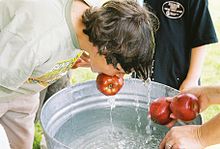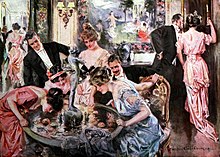 Apple bobbing, also known as bobbing for apples, is a game often played on Halloween. The game is played by filling a tub or a large basin with water and putting apples
in the water. Because apples are less dense than water, they will float
at the surface. Players (usually children) then try to catch one with
their teeth. Use of arms is not allowed, and often are tied behind the
back to prevent cheating.
Apple bobbing, also known as bobbing for apples, is a game often played on Halloween. The game is played by filling a tub or a large basin with water and putting apples
in the water. Because apples are less dense than water, they will float
at the surface. Players (usually children) then try to catch one with
their teeth. Use of arms is not allowed, and often are tied behind the
back to prevent cheating.In Scotland, this may be called "dooking" (i.e., ducking). In northern England, the game is often called apple ducking or duck-apple.
In Ireland, mainly County Kerry, it is known as "Snap Apple", and in Newfoundland and Labrador, "Snap Apple Night" is a synonym for Halloween.
History
When an apple is sliced in half, the seeds form a pentagram-like shape, and it is thought that the manifestation of such a symbol meant that the apple could be used to determine marriages during this time of year. From this belief comes the game bobbing for apples During the annual celebration, young unmarried people try to bite into an apple floating in water or hanging from a string; the first person to bite into the apple would be the next one to be allowed to marry.
The custom is mentioned (along with apples suspended on a string) in 18th century Ireland by Charles Vallancey in his book Collectanea de Rebus Hibernicis.
Girls who placed the apple they bobbed under their pillows were said to dream of their future lover.
Health risks
Due to the nature of the game, whereupon a number of individuals each place their entire head into a bowl of water, it is thought to be a somewhat unsanitary game to play. A potentially more sanitary variation of the game exists, with the apples hung on string on a line, rather than in a bowl of water.


No comments:
Post a Comment